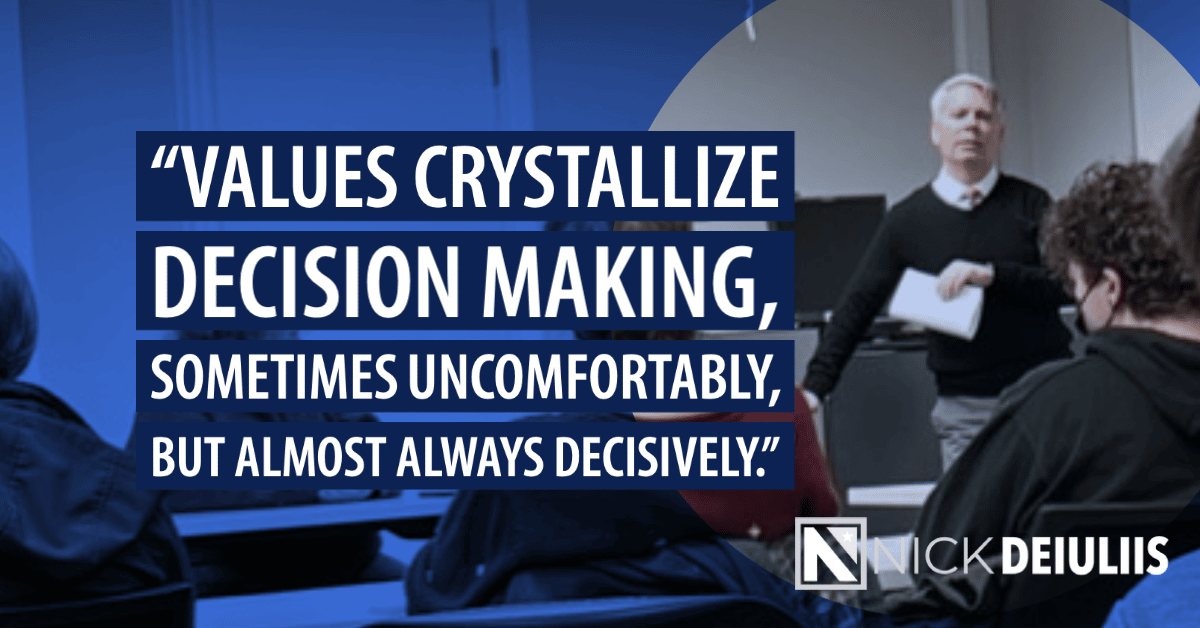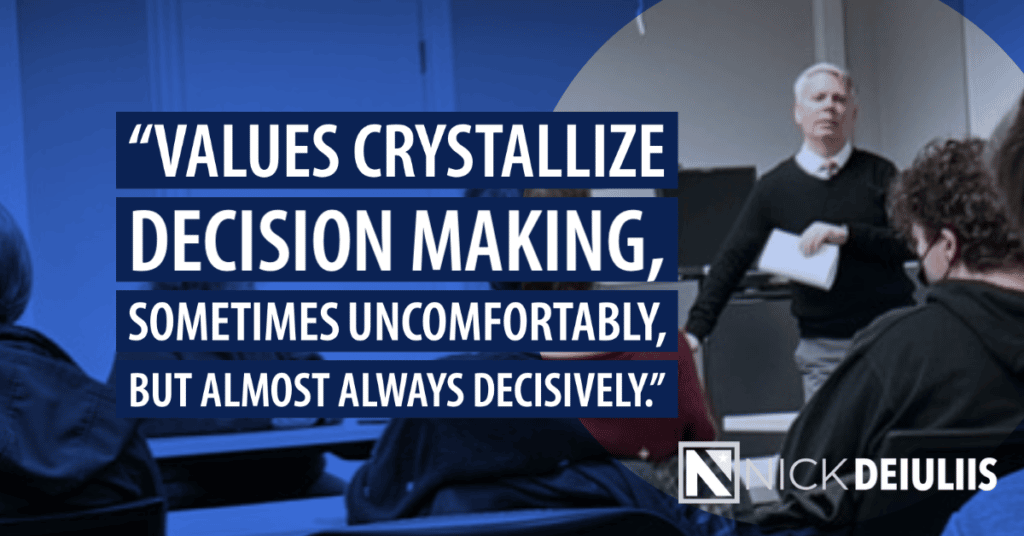The following comments were delivered by Nick on November 30, 2022, to an Ethical Leadership class at Marietta College.
I see the title of this course, Ethical Leadership, and it raises all kinds of thoughts and issues in my head. As it should. Big stuff, important stuff, good stuff.
Every leader, certainly in business, will say she or he wants to be ethical. If you find one who says otherwise, run as fast as you can. But every individual and company define what is ethical differently. And some don’t define it at all, leaving it up for random interpretation by employees, shareholder owners, or community stakeholders.
Please allow me to explain how I and the company I work for, CNX Resources, view ethical leadership. In the context of the energy industry, Appalachia, and what is soon to be 2023.
What I am about to walk through sounds a bit like a recipe, and I suppose to an extent it is. We are baking an ethical leadership cake.
I start with the most important component to our recipe of ethical leadership: having absolute conviction that what we do on behalf of society matters, greatly. The women and men who work in our industry and on our team toil in truly noble endeavors. Without them, society ceases to function and stops.
Really bad things happen to the human condition if we stop – from infant mortality skyrocketing to life expectancy plummeting, with individual rights and quality of life being devastated in between. This, by the way, is a scientific certainty and a mathematical truth. It’s not opinion, it’s reality.
Ok, so what we do truly matters and is impactful. But then what? Well, the next step of the recipe recognizes that a company or team needs a cultural identity, one that pins itself to a set of clear values.
Note I said values and avoided the term ‘priorities.’ Values and priorities: let’s talk about the difference. Priorities change as conditions change. Values are constant within a culture – they are there in boom/bust, profit/loss, good/bad periods.
At CNX, the three values we identify with are ‘ownership,’ ‘responsibility,’ and ‘excellence.’ Now I can give short descriptors of each, and we indeed have them. But know that these values are best recognized under the context of ‘we can quibble over the specific definitions, but in the end, you will know the value when you see it.’
All the tools, tactics, and decisions made day-to-day and over time need to live in concert with those three values.
The values serve as decision-making filters. From whether to shut something down on the front-line operations to whether a certain strategy makes sense.
Values crystallize decision making, sometimes uncomfortably, but almost always decisively.
Values also drive who is on the team and who stays on the team. If decisions are consistent with values, you will attract and retain talented individuals who epitomize your culture. And you should expect to lose individuals, perhaps many of them talented, who do not buy into the company values.
Next step in the recipe: if you are making decisions consistent with your values in an endeavor that is impactful to society, you should see a few signs materializing. This is the part I just referenced of ‘knowing it when you see it.’ What are those telltale signs for a company like CNX, with our values of excellence, ownership, and responsibility?
Embracing metrics that matter and defining a true north. Our true north is maximizing the long-term intrinsic per share value of the firm.
Our metrics that matter include total median compensation of employees being over $160,000 and leading the region, low employee attrition and long tenure, the ability to recruit top talent, meritocracy and pay-for-performance, and a spectrum of diversity with the most important being of thought and background.
Our values also require transparency, particularly when we don’t bat a thousand, by exposing and celebrating coming up short. Risk-taking on challenging opportunities where success is not guaranteed, and some level of failure is certain. Technology adoption and pushing the state of the art. Long termism; on investment decisions, standards, and careers.
The final ingredient to this recipe of ethical leadership is proactive advocacy. Engaging in public discourse. Celebrating the noble endeavor. Rebutting the falsities.
This was the toughest step of the recipe for me. Fifteen years ago, 10 years ago, maybe even five years ago, I would not be here. I subscribed to political quietism, where I kept my head down and ignored whatever was going on beyond the immediate team.
But I came to realize that was not a path that embodied our values. Today, not only am I here, but I have a website, I am active on social media, I have a weekly podcast, and I wrote a book. I don’t seek a dime from any of it. All were stoked by a sense of duty of advocacy.
Now as we wrap, I want to go back to the bigger picture of ethical leadership. I am an apostle of the great economist, Milton Friedman. I believe the duty of a business is to maximize its profits for the owners.
There are good ways and not-so-good ways to go about that, of course. And I believe I work with a team that has cracked the code of living up to Friedman’s view, but in the greatest of ways!
But what you hear today in media and from politicians is how Friedman was wrong. And this talk of the ‘social purpose’ of a business and serving ‘stakeholders’ beyond owners. Let me fill you in on a little secret: much of that talk is utilized to do one of two things.
One purpose is to allow those looking to commandeer commerce, the free market, and capitalism and turn them into weapons to attack the individual, freedoms, and civil liberties, and to grow the influence of government, elites, or the expert class. Beware of such intentions.
Another purpose is to allow so-called leaders in business to hide behind the squishy and wider ‘social purpose’ and ‘stakeholders’ taglines to avoid accountability and to continue to enjoy power under the cruise control of mediocrity. Avoid such leaders, for you and your team will never realize your potential.
To recap: want to be an ethical leader? The recipe has four steps:
Step 1: Work in an endeavor or industry that is noble and truly matters to society.
Step 2: Make sure the culture of the team embodies values that are broadcast and that resonate with you. Use them as decision filters. For me and CNX, they are excellence, responsibility, and ownership. Figure out what they should be for you.
Step 3: Look to symptoms of good culture consistent with those values. You should see signs of them everywhere, and if you don’t, the talk might be cheap.
Last step: Advocate intensely, constantly, and eagerly.
And, oh yeah, once this ethical leadership cake is baked, ice it with making sure you do all of this while having the most fun you could ever imagine!




